|
Spiritual accompaniment has been discussed greatly today within the Church and is an important theme of Pope Francis’ papacy. While accompaniment is manifested throughout the Old Testament and in Christ’s ministry, it is important for the Church to consider how best to implement it in modern times. What does accompaniment look like today? How do we best accompany others along their spiritual journey in deepening their relationship with Jesus Christ? The Art of Accompaniment: Theological, Spiritual, and Practical Elements of Building a More Relational Church, a Catholic Apostolate Center resource developed by Colleen Campbell and Thomas Carani, assists in the growth of true accompaniment within the Church today. Below are ten quotes from The Art of Accompaniment that summarize some of the major points of this important resource in order to introduce you to accompaniment and its role for Christians today. 1. “Since the creation of human beings, God has communicated his love through a relationship with humanity…The Old and New Testament reveal the Trinitarian God to be a God who accompanies.” God models accompaniment for humanity in his self-revelation and relationship with his people throughout salvation history. After the Fall, God revealed himself in his various relationships with important figures such as Abraham and Moses in the Old Testament, culminating in the sending of his Son, Jesus Christ, for the salvation of the world. God Himself is the first model of accompaniment. We look to His example in order to understand and implement accompaniment in the Church today. 2. “Spiritual accompaniment is the apostolate of intentional relationship that is oriented toward a definitive direction of growth in holiness and transformation in the Person of Christ.” Colleen and Tom define accompaniment succinctly: spiritual accompaniment does not happen by accident, but is the result of an intentional decision made by two people. The goal of spiritual accompaniment is a deepening in one’s personal relationship with Jesus Christ and in personal holiness that transforms both the mentor and the person being accompanied, as well as those they encounter. 3. “To remain committed to this deliberate choice of discipleship, a mentor is an active participant in their own spiritual formation, deliberately choosing the path of discipleship as their everyday way of life.” A mentor never ceases to pursue holiness, personal development, and spiritual formation. These are life-long endeavors to which the mentor and the person being accompanied dedicate themselves. 4. “Listening is a crucial practice of the mentor because it not only creates space for openness between mentor and the one accompanied, but also makes room for an awareness of the presence and action of God.” An important part of the spiritual life that Pope Francis has emphasized is the art of listening. We must be silent in order to hear the voice of God and the promptings of the Holy Spirit. The ability to listen well is also incredibly important to the art of accompaniment. When a mentor is adept in the art of listening, he or she affirms the dignity of the person being accompanied and humbly leaves room for the voice of God to be heard and acknowledged. 5. “Discernment is a supernatural gift of the Holy Spirit and useful in coming to identify the movements and actions of God in daily life.” Both the mentor and person being accompanied must grow in their ability to discern the work of God and the presence of the Holy Spirit. While there are many resources within the Church that help form a person in their understanding of discernment, it is ultimately a gift of the Holy Spirit. By praying for clarity, understanding, and wisdom, and by approaching the accompanying relationship in a posture of humility, both the mentor and person being accompanied create an environment in which the actions of God are received and acted upon. Ongoing discernment is crucial to spiritual accompaniment. 6. "Mentors are formed by the community as a result of encountering diverse groups of people, listening to different perspectives, seeking guidance from others, and worshipping and seeking Christ amongst the family of the children of God." The spiritual life does not and cannot exist in a vacuum; the same is true with accompaniment. Both the mentor and person being accompanied are formed by their parishes and communities. The beauty of our relational existence is that our communities of faith are comprised of all sorts of people. This diversity within our parishes enriches each member of the Body of Christ and deepens compassion, understanding, and a spirit of inclusion that helps the mentor better accompany another person. 7. "As they share the journey of the Christian life with the one accompanied, the mentor evangelizes the accompanied by fostering an encounter with Christ in their daily life, drawing connections between the Gospel message and their everyday experiences, and encouraging them toward ongoing conversion to Christ through the relationship of accompaniment." An important aspect of accompaniment is that it is a mutual journey towards Christ. Accompaniment does not happen only in Church settings and does not only address topics of faith—it encompasses an entire life. Our faith life also does not occur in a vacuum, but should impact and inform every aspect of our existence. As a result, accompaniment helps both the mentor and the one being accompanied to draw connections between the Gospel and everyday life. 8. "Those accompanied are open to formation and display their willingness to be formed by authentically seeking holiness, collaborating with their mentor, remaining humble in the midst of difficulty, and giving thought and prayer to challenges or new ideas…they must seek faith formation through study, catechetical ministry through parishes or Catholic institutions, and their own personal learning." Humility is a crucial component of an accompanying relationship—especially for the one being accompanied. The person being accompanied acknowledges the need to walk alongside a mentor and to be formed by them in order to grow in holiness and a relationship with Christ. Therefore, the mentor is an authority figure that respectfully and lovingly informs and collaborates with the one being accompanied, as well as with the Holy Spirit. Furthermore, the one accompanied also seeks personal formation in other trusted places. 9. "In the relationship of accompaniment, the marginalized are provided a space in which they can come to deeply know the love of Jesus Christ through friendship, guidance, and authenticity with a mentor." No one is exempt from an accompanying relationship—it is an important part of the spiritual life that all are invited to. A relationship of accompaniment results in the greatest treasure on earth: friendship with and love of Jesus Christ. A mentor is more than an authority figure. He or she is a friend, helper, and guide who affirms a person’s dignity and walks alongside another to build up the Body of Christ. 10. "The inspiration and model for the apostolate of accompaniment is Mary…In Mary, the Church has a model and intercessor for the apostolate of accompaniment." We cannot have a vibrant and lasting life of faith and thriving relationship with Christ without looking to and having a relationship with His Mother, Mary. The Blessed Virgin Mary always leads us closer to her Son. By looking to her and seeking her guidance and intercession, we can be sure that our efforts to accompany and be accompanied will bear much fruit. To learn more about The Art of Accompaniment and order your copy today, please click here.
1 Comment
One of the great gifts of the Second Vatican Council and the liturgical renewal of the twentieth century was the emphasis given to the proclamation of the Word of God at all sacraments, primarily at the celebration of Mass. Popes, bishops, and theologians have all sought to highlight the relationship of the life of the Church in every dimension to the Sacred Scriptures. Scripture is the foundation of all that we do as Catholics, ultimately because Scripture is the Word of God. These divinely revealed truths tell us who God is, what He has done throughout history, and what he continues to do, working in our lives each day. Pope Francis, in continuing this call for a renewed sense of awe and appreciation of the Word of God, has proclaimed the third Sunday of Ordinary Time as “Word of God Sunday.” This past Sunday, January 26, was the first observance of Word of God Sunday, and so this week is a great time to reflect on the role that Scripture has in our lives as we seek to model our lives on Jesus Christ, the Word of God. In reflection, we can ask how do we allow the scriptures to permeate our lives so that God’s word is alive in us? Maybe we have a favorite passage, one that we return to again and again to meditate on at different stages in our lives. Or maybe we haven’t really spent much time with Scripture, aside from hearing it at Mass or other occasions in Church. This week, this Word of God Sunday, serves as a reminder to take the gift of Scripture and to allow the Word of God to seep into the rhythm of our lives so that we more fully and deeply come to know our Lord and ourselves. One of my favorite passages of Scripture is from the 24th chapter of the Gospel of Luke following the Resurrection of Jesus. We hear of the encounter that two disciples had with our Lord while walking on the road to Emmaus. These two disciples were stunned at what had taken place and were unsure of what to make of the crucifixion and death of the man they believed to be the Messiah. They were sad that their friend and leader, Jesus, had been so cruelly murdered, and were overcome with grief. When they encounter this man, a man they “were kept from recognizing” (Luke 24:16), he asked them to recount these events. Their almost sarcastic response – “Are you the only stranger in Jerusalem who does not know the things that have taken place there in these days?” (Luke 24:18) – shows us how human an experience this was for the disciples. They explained everything to this man and were shocked that he had no idea what had happened. Little did they know, they were speaking with Jesus himself! So often we focus on one problem or another, are so concerned with our own difficulties, or so caught up in our joys that we forget to consider how the Lord is working in our lives. We don’t always welcome him in and we neglect to see that, in reality, he has been there all along, walking with us on the way. Sometimes, like these two disciples, it is not until later that we see God’s work in our lives, only in reflection. It was not Jesus’ explanation about the work that God has done since Moses and the prophets that opened their eyes to the reality before them. St. Luke tells us, instead, that “was made known to them in the breaking of the bread.” (Luke 24:35) Isn’t this our experience today? We come to know about God through study or reading. But it is in and through the sacraments – especially in the Mass – that we come to know God most fully. When we pray with the Word of God in Sacred Scripture, we open our hearts to an encounter with the living God. We may not recognize him right away—it may take time or a change in our life to make it clear—but those moments when we have a real encounter with God can show us how much he has done in our lives, how close he has been all along, teaching us, guiding us, and preparing us for the great things he has in store. May this Word of God Sunday be a new invitation to welcome the Lord into our lives through his Word. May our hearing and reading of Sacred Scripture always be an encounter with God. “Seek God and you will find God. Seek God in all things and you will find God in all things. Seek God always and you will find God always.” – St. Vincent Pallotti
Do we live our lives seeking God or realize that God is seeking us? God is indeed seeking us. In fact, we have been found in our Baptism. We enter into the mission of the Son who was sent by the Eternal Father into the world to save us. We are co-responsible for this mission and are in “holy cooperation” with the Most Blessed Trinity. Therefore, we are sent by Christ as his apostles or missionary disciples into the Church and the world to revive faith and rekindle charity. We accompany other seekers in becoming found in Christ and through his Church. Today is the 170th anniversary of the death of St. Vincent Pallotti. It is also his feast day. He believed, taught, and lived the ideals of accompaniment, co-responsibility, and holy cooperation mentioned above. His foundation, the “Union of Catholic Apostolate, a gift of the Holy Spirit, is a communion of the faithful who, united with God and with one another in accordance with the charism of St. Vincent Pallotti, promote the co-responsibility of all the baptized to revive faith and rekindle charity in the Church and in the world, and to bring all to unity in Christ” (General Statutes, 1). This means that lay people, those in consecrated life, and clergy are in collaboration with one another, not only in the Union, but also in the Church and with those of good will in the world. Each person has a role. Each person is responsible. Each person shares in the mission of the Church in spreading the Gospel. Pope Francis recently wrote about this shared mission in his Apostolic Exhortation, Christus Vivit. He was writing about ministry with young people, but these words can be extended to all the baptized. “Youth ministry has to be synodal; it should involve a ‘journeying together’ that values ‘the charisms that the Spirit bestows in accordance with the vocation and role of each of the Church’s members, through a process of co-responsibility... Motivated by this spirit, we can move towards a participatory and co-responsible Church, one capable of appreciating its own rich variety, gratefully accepting the contributions of the lay faithful, including young people and women, consecrated persons, as well as groups, associations and movements. No one should be excluded or exclude themselves’” (Christus Vivit, 206). For co-responsibility to be truly a lived reality there is much more work to be done. St. Vincent Pallotti was visionary and prophetic in his understanding, but the work was unfinished. Let us not wait. Instead, let us "remember that the Christian life is one of action; not of speech and daydreams. Let there be few words and many deeds and let them be done well." Blessed feast day of St. Vincent Pallotti! May the Charity of Christ urge us on! “Who did you pick as your confirmation Saint?”
“St. Vincent!” “Oh cool, St. Vincent DePaul, that’s great!” No…not him…St. Vincent Pallotti…” “Who is that?” The name game for saints with common names is a frequent and sometimes frustrating occurrence, as is often the case with St. Vincent Pallotti—my patron, confirmation saint, and friend. Pallotti was many things: the friend of popes and cardinals, confessor of many of the religious in Rome at the various colleges, and great supporter of the laity. Throughout his 55 years of life, Pallotti did everything for the infinite glory of God (infinitam Dei gloriam). His life, message, and charism were life-giving and meaningful while he was alive, as well as today. Many saints can seem out of our reach—St. Joseph of Cupertino is known for flying and St. Padre Pio of Pietrelcina received the stigmata. While there are accounts of St. Vincent Pallotti levitating and bilocating, his life and legacy are not marked solely by these acts of mysticism. One of the main reasons that Pallotti’s example resonates so deeply with me in 2020—170 years after his death—is because of how humble and “normal” his life was. Now, “normal” is quite relative, but in comparison to many well-known saints, Pallotti’s life was normal, even boring. Pallotti’s parents were devout and his love for Christ and the Church was evident from a young age. There are many stories of St. Vincent’s great care for the poor, including a story of him giving away his bed to a beggar. St. Vincent was not a particularly good student as a young boy, and it was not until his mother prayed a novena to the Holy Spirit for his education that Pallotti became a model student. As a priest of the Diocese of Rome, Pallotti spent much of his time hearing confessions. After a cholera epidemic struck Rome in the mid-1800s, Pallotti founded a home for orphaned girls. He set up night schools so that working men could receive an education. He was also a mathematician. In fact, it was in his study of calculus that he came to understand God as Infinite Love. There was no deed too small, no task unworthy of his effort. To the 2020 Catholic Church in the United States, Pallotti’s great interest in collaboration with and co-responsibility of the laity might not seem outrageous, but in the 1830s and 1840s in Rome, it was. Many of Pallotti’s closest collaborators were lay people, one of whom was Blessed Elisabetta Sanna. He also made sure that the various ministries and apostolates that he established involved the laity not just as pawns or placeholders, but as central actors in the life of the Church. St. Vincent Pallotti can teach us so much. He struggled greatly with anger and pride; in this we learn that we are not alone in our personal struggles. He lost many of his siblings when he was young; in this we learn that we are not alone in our loss. He turned people’s attention to God when he distributed pamphlets during the Roman carnival, or when he would drop a reliquary from his sleeve so that the Romans who would come to kiss his hand (as was customary to do to priests at the time) would kiss it instead of him. In this, we learn that we too can persevere when the world around us tells us things that are contrary to what we believe. I learn from St. Vincent Pallotti every day. He is a model for me in perseverance, humility, and devotion to God. When I sin and fall, I remember his personal reminder that he was but “nothingness and sin.” When I look at the apostolic works that I take part in, the ones that are looked down upon or seen as unrealistic, I think back upon Pallotti and the same judgements that many must have made about him. The greatest influence that St. Vincent Pallotti has had on me is the image of God as Infinite Love—that Infinite Love can love me at my best and my worst. The Infinite Love of God is what balances the scale with sin on one side and being the beloved of God on the other; it reminds us who God is in his greatest depth. My life and my faith have been so greatly touched by St. Vincent Pallotti and I am deeply thankful for him. May he continue to intercede for us all and may we, as we undergo our apostolic works, look to him as a mentor, a guide, and a dear friend. St. Vincent Pallotti, pray for us. To learn more about St. Vincent Pallotti, please click here. I lead the Catholic Volunteer Network (CVN) – but am not Catholic. My journey to this unique place has not been overnight or accidental. It comes from years of commitment to unity.
CVN is the leading faith-based service organization fostering full-time, faith-based lay mission service. Our membership consists of 155 Christian volunteer programs serving throughout the U.S. and in over 100 countries. In any given year, up to twenty percent of our programs may be identified as Protestant. In addition, volunteers who serve in CVN programs range from cradle-Catholics to spiritual seekers. Recently, the CVN Board of Directors affirmed the importance of witnessing to our identity as Catholic and ecumenical. This approach works because, to a great degree, both CVN programs and volunteers respect each other’s identities and goals. As they learn about each other via extensive application processes, a relationship of understanding and trust begins. The result is clarity about needs and expectations, and in many cases a willingness to engage with “the other” for a significant amount of time. When a year-long volunteer community is ecumenical, learning that enhances and transcends that experience can transpire. CVN thinks that is good—that faith and mission throughout life in a complicated world requires an openness to understand other approaches to faith, community, and service. Openness to different experiences put me on a path of fostering Christian unity. Therefore, when a role with CVN became a possibility, I was drawn to it not despite it being Catholic – but because it is Catholic. I wanted to be part of a network discerning how a commitment to Jesus Christ unites us and enhances witness to his Gospel in the world. But I did not get to that place without a mixture of providence and intention. Years ago, I was the Director of Public Policy for Call to Renewal (CTR), a diverse network of national churches and faith-based organizations united to overcome poverty. CTR’s vision was that Christians from across the theological spectrum working together could inspire other Christians to foster relationships across denominational affiliations, as well as inspire political leaders to work together across the aisle. It was an attempt to break down the divides created by labels such as liberal and conservative, and to honor a range of anti-poverty strategies often considered to be at odds with each other (e.g. strengthening families and supporting government programs). Members of CTR included Protestants, Evangelicals, Catholics, Peace Churches, and more. National leaders from these churches agreed that progress could be made to reduce domestic poverty if they chose not to allow theological and doctrinal differences on other matters to prevent collaboration. Because of this, many Christian leaders met counterparts for the first time and nurtured relationships grounded in openness and a willingness to learn. Many found a new respect for different approaches to faith, as well as different views on how to reduce poverty. That experience and others broadened my theological and political perspectives. Since then, I have sought to build relationships and bridges. I still have convictions and disagree with others, but am less likely to judge quickly or to shut doors. I am more likely to be curious about how God wants me and others to engage despite differences. Sometimes unity means affirming a shared connection to Christ, getting to know another, and seeing where that leads. Sometimes it is a strategic partnership to pursue change. I just try to witness to what I believe – and pray God can act through me and others. I pray that you, too, find special ways of witnessing to the strength of Christian unity. I pray that openness and experience will transform you. The world needs our example. To learn more about Christian unity, please click here. To learn more about faith-based service opportunities with the Catholic Volunteer Network, please click here. As we embark on yet another faith-filled adventure of a New Year and with it the thought of all those New Year’s resolutions, I would like to invite you to reflect with me on Jesus’ words offered to the Pharisees in the Gospel of Mark:
Likewise, no one pours new wine into old wineskins. Otherwise, the wine will burst the skins, and both the wine and the skins are ruined. Rather, new wine is poured into fresh wineskins. (Mark 2:22) Jesus, throughout the Gospels, is always inviting us to examine and “re-view” the condition of our hearts above everything else. His words above, albeit confusing at first, shed light on His Heart and His promise to us: “I have come that they might have LIFE and have it more abundantly” (John 10:10). I think we would all agree a more abundant life is what we pray and hope for at the beginning of each New Year. The rising question, however, is “how do we get there?” The answer, I believe Jesus offers us, is contained in His advice given to the Pharisees. He says the pathway to an abundant life lies within the condition of our hearts – the readiness of our “wineskins.” Our hearts like the wineskins, Jesus says, must be constantly renewed and “refreshed” ready to hold that new wine or grace He is always willing to give to us – and thus become for the world a witness of “grace at work.” You see, the Pharisees were so concerned with the do’s and don’ts on their list that their identity, as children of God, was lost in a sea of narrow-minded laws and disciplines. They gave up the opportunity for new wine and new hearts! Even though the prophet Ezekiel proclaimed that God wanted to give them New Hearts all along (c.f. Ezekiel 11:19), they didn’t want to give up their “old wineskins” (old hearts) and place the “new wine” (grace) Jesus was offering them into “fresh wineskins” (converted hearts). In fact, this is what happens to many people and their “New Years resolutions” when their hearts remain unchanged and unaffected by Grace. They sometimes end up rejecting their resolutions because they had nowhere to store the new wine that Jesus offered them. They couldn’t see beyond the “do’s and don’ts” – the “idols” they had created for themselves are powerless towards true change. We must never allow our resolutions to become idols separated from the truth and light of Grace within our hearts. For only those who are pure in heart will see what God is truly offering them (c.f. Matt 5:8). And so, in this sense, I would offer that the goals and resolutions we set every year are re-viewed according to the condition of our hearts. “Re-viewed” so that we’re careful the “new wine” (grace-filled change) Jesus offers us this New Year isn’t going to be poured into the same old “wine-skins” or wasted in a bucket of “empty promises” we often leave ourselves with. But, that our hearts are truly renewed and store within them the new wine, the new life, the new truth of who we are and meant to be. Thus, in keeping our hearts renewed, we prevent the grace-filled resolutions (“new wine”) we accept from Him for this New Year from becoming just another space to fill up on the old “to-do” list (“old wineskins”) that is quickly abandoned and lost altogether. Jesus, this New Year, is offering us an opportunity to really accept something completely new and re-energizing –a new heart ready for His grace to fill it and complete it. I’m talking about experiencing a real encounter with Jesus and a true conversion of the heart! I believe that understanding our New Year’s resolutions from this perspective will inevitably lead us to a deeper relationship with Him and most certainly place us on the road to becoming the person we’re meant to be – physically, mentally, spiritually, the best version of yourself! At last, new wine in fresh wineskins! Bart Zalvetta is a member of the Theology Department of Skutt Catholic High School in Omaha, Nebraska The arrival of New Year’s Day often brings with it resolutions, goals, and new words or phrases that help us try to shape the next 365 days before us. Things like healthy eating, stricter budgets, more time spent in prayer, and increased amounts of exercise define our drives for self-improvement. We give extra time to turn our focus inward to make ourselves stronger, smarter, holier, and healthier. In an attempt to change our lifestyles, we might separate ourselves from our previous habits, relationships, or preferences so that we can sharpen our focus even more on self-growth. We hone our discipline and increase our self-reliance in the name of improvement. In the new year, our focus is often inward. While this inward focus isn’t harmful in itself, we might find ourselves stuck in our self-reliance. Now that a few weeks into the new year have passed, many of those resolutions, goals, and mantras might have faded into the background of post-holiday life. At this point, many of us have lapsed in our new practices, or we might have abandoned our resolutions altogether. We might find ourselves isolated in the new patterns we have picked up or starting to flounder due to a lack of support. Even though our New Year’s resolutions may have been made with the best or holiest of intentions, we might find ourselves failing without others to encourage us, support us, or hold us accountable. While the new year is the time when our focus is inward, the weeks soon after, when our discipline begins to wane, give us cause to lean outward. What would it look like to lean outward in our resolutions in the weeks ahead by seeking others to help us carry them out? Why might allowing ourselves to be helped by others and accompanied by them lead us to a more meaningful and spiritually significant pursuit of our resolutions? Though as Catholics we frequently hear about accompaniment in a context of explicitly spiritual progression, its fruitfulness is still applicable in non-explicitly spiritual goals in an informal sense. As the final document from the Synod on Young People, the Faith, and Vocational Discernment reminds us, “accompaniment cannot limit itself to the path of spiritual growth and to the practices of the Christian life” (Final Synod Document, 94). Accompaniment can help us experience transformation in many areas of our lives in addition to our spiritual life, as it “fosters growth in holiness through everyday circumstances and interests” (The Art of Accompaniment, 15). Though on the surface it may look like simply reaching out for the help of a friend, seeking out accompaniment to help us carry out our New Year’s resolutions has a deep theological and spiritual significance. Accompaniment is a form of “bear[ing] one another’s burdens [in order to] fulfill the law of Christ” (Galatians 6:2). When we seek another’s help to bear our burdens, experiences, hopes, and challenges, we open ourselves up to be in communion with someone else; we profess that we were created by God out of love, to love, and to be loved by others. Accompaniment is a simple way by which we actively remember that “The LORD God said: It is not good for the man to be alone” (Genesis 2:18). When we seek the help of another, we affirm the beauty of being human: we’re not meant to live life completely on our own effort and initiative. Having a good listener, mentor, or friends helps us to turn our inward focus in our resolutions outward. We no longer remain alone in our efforts, strivings, or discipline. The support of another trusted person helps us remain steadfast in our resolution to be healthier, spend more responsibly, or love more generously. This support can take the form of a quick text from an accountability partner to check in on our progress, or a weekly meet-up with a mentor to discuss our challenges. Similarly, we can seek more formal relationships of accompaniment to help meet our goals. Beginning a relationship with a therapist might help us explore more deeply our relationship with others or just as seeking the help of a personal trainer might allow us to have the added accountability to eat more nutritiously or get physically fit. Relying on others in the pursuit of transforming ourselves reminds us of the beautiful gift of being human: as human beings, we can have a profound effect on one another in providing support, love, and encouragement in growing into the people God has destined us to be. Whether sought out in a formal or informal sense, accompaniment challenges us to let ourselves be loved by others in the simplicity and complexity of our everyday life. Allowing ourselves to be supported by others, even in something as simple as our New Year’s resolutions, reveals the deep significance of others to our vocation to holiness.
In Romeo and Juliet Shakespeare famously asked, “What's in a name? That which we call a rose by any other name would smell as sweet.” Names convey not only an identity, but also one’s familiarity, intimacy, and attention with the subject. We are each taught the names of our surroundings in our infancy so as to be able to associate experiences and qualities with them. And this spirit of discovery continues even today, with great ceremony being performed upon uncovering an unknown celestial body, lifeform, or element. To name something is to also claim dominion over it. In Scripture, for example, Adam was tasked to name the creatures of the earth. In Genesis we read, “So the LORD God formed out of the ground all the wild animals and all the birds of the air, and he brought them to the man to see what he would call them; whatever the man called each living creature was then its name.” To call something by name implies a relationship with the person or thing named. That is why when Moses asked God Who he should say sent him to free the Hebrews from slavery, the Lord revealed the Divine Name:
Then Moses said to God, “If I come to the people of Israel and say to them, ‘The God of your fathers has sent me to you,’ and they ask me, ‘What is his name?’ what shall I say to them?” God said to Moses, “I am who I am.” And he said, “Say this to the people of Israel, ‘I am has sent me to you.’” God also said to Moses, “Say this to the people of Israel, ‘The Lord, the God of your fathers, the God of Abraham, the God of Isaac, and the God of Jacob, has sent me to you’: this is my name for ever, and thus I am to be remembered throughout all generations. This example illustrates the power of God’s Name. It is how He identifies Himself to the people of Israel and legitimizes their relationship as His Chosen People. God’s name is also sacred and demands respect. Recall the Second Commandment, as written in the Old Testament: “You shall not invoke the name of the LORD, your God, in vain. or the LORD will not leave unpunished anyone who invokes his name in vain.” (Exodus 20:7 and Dt 5:11) The name of God is so holy that the Jewish people dare not even pronounce it out loud. As Catholics, we are similarly taught that God’s name is of the utmost holiness and should only be invoked in one’s speech to bless, praise, or glorify the Lord (cf. CCC 2142-2149). His name must never be abused by careless speech, false oaths, words of hatred, defiance of God, or used in unholy ceremonies. This applies to the name of Jesus as well: Therefore God has highly exalted him and bestowed on him the name which is above every name, that at the name of Jesus every knee should bow, in heaven and on earth and under the earth, and every tongue confess that Jesus Christ is Lord, to the glory of God the Father. In his 2007 book, Jesus of Nazareth, Pope Emeritus Benedict XVI observed that God established a relationship with mankind when He revealed His name to Moses. The Incarnation, he continued, was then the fulfillment of the process that “had begun with the giving of the divine name” (Benedict XVI, 144). This relationship did not make man equal to God but “protect[s] the wonderful mystery of his accessibility to us, and constantly assert[s] his true identity as opposed to our distortion of it”(Benedict XVI, 144-145). And Christ Himself underscored the sanctity of His Father’s Name with the inclusion of “hallowed be thy name” in the prayer He taught His disciples. We pray with these words each week in Mass. As we do, have we realized the importance of what we are saying? To remind us of this truth, the Church has instituted the Feast of the Holy Name of Jesus (in its current form) as an optional memorial to be celebrated on January 3 of each year since 2002 (but originally established by Pope Innocent XIII on December 20, 1721). How great a gift that the Lord God Almighty has so intimately revealed Himself to us! Unfortunately, in today’s society there is no limit to the number of times when our culture irreverently invokes God’s name in the media, creative works, and everyday conversation. As we begin a new calendar year, how can we better model respect and humility when using God’s holy name? Can we do anything in our classrooms, workplaces, or online profiles to witness a life of respect and reverence for God? As Catholics, we are blessed to be able to pray to and know a personal God who has revealed not only His name, but even sent His only Begotten Son to be among us—something we remember this Christmas season. Let us rejoice in this knowledge and continue to cry out with our lives, “O Lord, our God, How awesome is Your name through all the earth!” -Psalm 8:2 We often hear that the saints must have been uncomfortable to be around. Their tendency to get straight to the point, to stop in the middle of a conversation to pray, to ask pointed, personal questions, to inquire about your relationship with God, and to be sincere about it all, might cause most people to be uncomfortable. Around these people who are striving to live authentic lives, you might find yourself itching to break eye contact, and to maybe talk about something a little lighter like the new TV show you’re watching or how it is supposed to be sunny all weekend. Though we may not all have encountered saints, many of us can point to people striving to live authentic lives. These people are often unrelenting. Uninterested in frivolities, they are interested in your soul. They want to get to the real you - the you that God made. The you without all the defenses, insecurities, wounds, and fears. But if they find those things, authentic people are also gentle in dealing with them. This is why a saint or an authentic person might make us uncomfortable. Truly authentic Christians allow the light of Christ to shine through them. And Christ is in the business of loving people. So when you are around these people, you are facing Christ through them and, all of a sudden, your real self—the one you have been avoiding and hiding—comes to the forefront. And there is a reckoning. This is what it felt like for me when I watched the movie A Beautiful Day in the Neighborhood, which is based on the true story of the journalist Tom Junod (known as Lloyd Vogel in the movie). Lloyd, who is portrayed as a cynical and unkind workaholic, is assigned to profile Mister Rogers’ Neighborhood’s Mr. Rogers for the magazine Esquire. The relationship that unfolds between them is a beautiful example of what happens when you let an authentic person into your life. I think all of us have at least one of these people in our lives; and if we don’t, we routinely search for, or try to become one. Throughout the movie, Lloyd, who comes from a broken family, struggles in his job of interviewing Mr. Rogers. Due to his cynical nature and a very strained relationship with his own father, he assumes that Mr. Rogers’s on-screen personality is just an act. He spends most of the movie resisting Mr. Rogers’s probing questions and his father’s attempts at reconciliation. Many of the scenes portray an awkward dialogue, with Lloyd becoming frustrated at Mr. Rogers for asking him so many questions! The story continues and the climactic scene shows Lloyd and Mr. Rogers in a restaurant, where he asks Lloyd to spend one minute “thinking about all of the people who have loved you into being.” Here, for a full minute, the camera pans to Mr. Rogers’ face, where he’s looking straight at you. For 60 full seconds you feel completely seen and known. After this moment, Lloyd lets down his guard and lets Mr. Rogers into his family brokenness. He comes to grips with himself, his past, and how all of that will affect his future. What happens is completely transformative. Once he forgives his father, he then accepts his identity as a father himself, and becomes more available to his wife and more supportive to his sister. The film quite beautifully shows that forgiveness has a ripple effect—once you forgive the cause of your largest wound, you experience healing, the people around you are unified, and everyone is able to love others better and more authentically. Lloyd was able to do this after he came to understand what Mr. Rogers was doing all along: searching for and loving people for who they really are, and engaging with that person, no matter how many walls they put up. Being seen and loved in this way then enables you to forgive quickly, heal faster, and love more. By following the example of Mr. Rogers, we can create families and neighborhoods that are more unified. Mr. Rogers, a beloved figure in American culture, understood what it meant to see, know, and love people at their very core, just as Christ and the saints did. People felt understood by Mr. Rogers and loved him in return. At the beginning of the movie, Lloyd felt uncomfortable with Mr. Rogers’ piercing gaze, personal questions, and spontaneous prayer; but as a result of Lloyd’s friendship with Mr. Rogers, Lloyd and his entire family came to experience healing and joy. In these ways, Mr. Rogers imitated Christ, who accompanied men and women throughout his ministry and encountered them in the midst of their brokenness and sin. Christ healed others by stepping into their brokenness with a love that inspired them to change and lead lives of holiness themselves. As we enter into the New Year, what changes can we make to better love our neighbor? How can we follow Christ and the example of Mr. Rogers and see, know, and love people in the midst of their brokenness? |
Details
Archives
July 2024
Categories
All
|
About |
Media |
© COPYRIGHT 2024 | ALL RIGHTS RESERVED




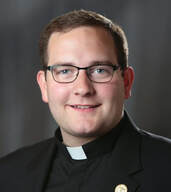
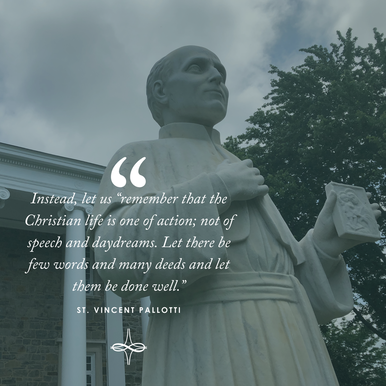
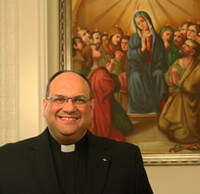

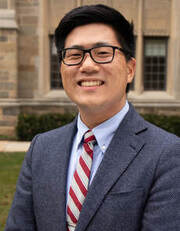
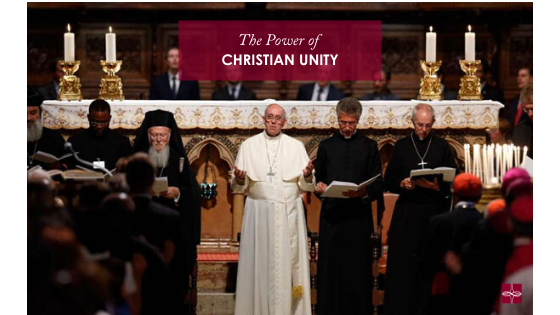




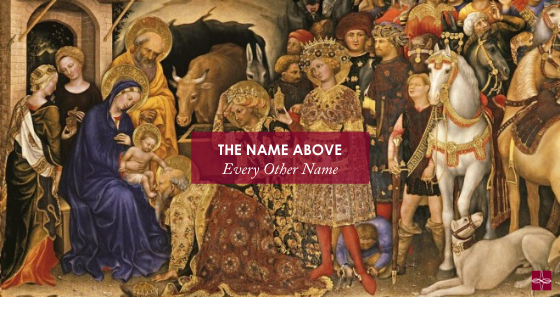



 RSS Feed
RSS Feed